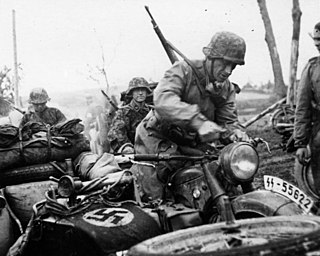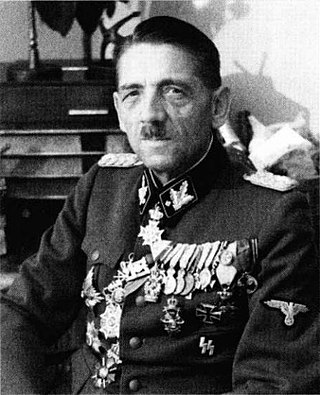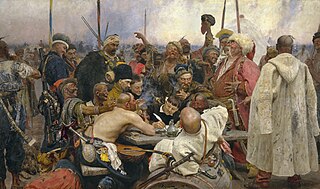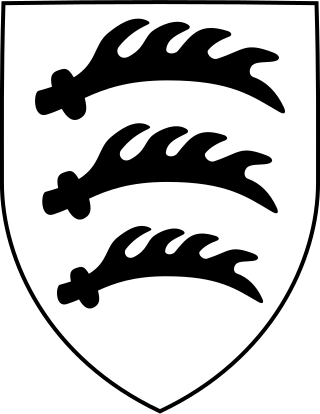
The Waffen-SS was the combat branch of the Nazi Party's paramilitary Schutzstaffel (SS) organisation. Its formations included men from Nazi Germany, along with volunteers and conscripts from both German-occupied Europe and unoccupied lands. It was disbanded in May 1945.

Felix Martin Julius Steiner was a German SS commander during the Nazi era. During World War II, he served in the Waffen-SS, the combat branch of the SS, and commanded several SS divisions and corps. He was awarded the Knight's Cross of the Iron Cross with Oak Leaves and Swords. Together with Paul Hausser, he contributed significantly to the development and transformation of the Waffen-SS into a combat force made up of volunteers and conscripts from both occupied and un-occupied lands.

Wilhelm Bittrich was a high-ranking Waffen-SS commander of Nazi Germany. Between August 1942 and February 1943, Bittrich commanded the SS Cavalry Division Florian Geyer, in rear security operations in the Soviet Union. From July 1944 until the end of the war Bittrich commanded the 2nd SS Panzer Corps in Normandy, during Market Garden and in Hungary.

The 5th SS Panzer Division Wiking or SS Division Wiking was an infantry and later an armoured division among the thirty-eight Waffen-SS divisions of Nazi Germany. During World War II, the division served on the Eastern Front. It surrendered on 9 May 1945 to the American forces in Austria.

Artur Gustav Martin Phleps was an Austro-Hungarian, Romanian and German army officer who held the rank of SS-Obergruppenführer und General der Waffen-SS in the Waffen-SS during World War II. At the post-war Nuremberg trials, the Waffen-SS – of which Phleps was a senior officer – was declared to be a criminal organisation due to its major involvement in war crimes and crimes against humanity. An Austro-Hungarian Army officer before and during World War I, Phleps specialised in mountain warfare and logistics, and had been promoted to Oberstleutnant by the end of the war. During the interwar period he joined the Romanian Army, reaching the rank of General-locotenent, and also became an adviser to King Carol. After he spoke out against the government he was sidelined and asked to be dismissed from the army.

The XV SS Cossack Cavalry Corps was a World War II cavalry corps of the Waffen-SS, the armed wing of the German Nazi Party, primarily recruited from Cossacks.

The Vienna offensive was an offensive launched by the Soviet 2nd and 3rd Ukrainian Fronts in order to capture Vienna, Austria, during World War II. The offensive lasted from 16 March to 15 April 1945. After several days of street-to-street fighting, the Soviet troops captured the city.
The X SS Corps was a short-lived Waffen-SS corps-level headquarters employed on the Eastern Front in 1945 during World War II.

Army Group E was a German Army Group active during World War II.

The 25th Infantry Division was a military unit of the German Wehrmacht. It was later reclassified to 25th Motorized Infantry Division, and in June 1943 to the 25th Panzergrenadier Division.
The LIII Army Corps was a corps of the German Army during World War II. It was first deployed in 1941 and was active as part of various armies under Army Group Centre until 1944, when it was destroyed during the Soviet Red Army operations Bagration and Kutuzov in June and July 1944. The corps suffered enormous casualties as a result of the Soviet attacks. All of its divisions were destroyed and all but a few of the soldiers were killed or captured by the Soviet Union. A new formation named LIII Army Corps was subsequently deployed in December 1944, when it was assigned to Seventh Army and fought on the western front until surrendering to United States Army forces in April 1945.
The CI Army Corps, alternatively also referred to as Roman 101st Corps, was a corps-level unit of the German Wehrmacht during World War II. It existed only for a few months during the year 1945.
The LXXXIX Army Corps was an army corps of Germany's Wehrmacht during World War II. It was active from August 1942 until March 1945. Its commander surrendered to United States Army forces on 2 April 1945.
The XXV Army Corps was an army corps of Germany's Wehrmacht during World War II.

The XXVI Army Corps was a Wehrmacht army corps during World War II. It existed from 1939 to 1945. It was also known as Corps Wodrig during the Invasion of Poland.
The LXIII Army Corps was an army corps of the German Wehrmacht during World War II. The corps was formed in November 1944.
The LXVI Army Corps, initially known as the LXVI Reserve Corps, was an army corps of the German Wehrmacht during World War II. The corps was formed in September 1942.
The LXXII Army Corps was an army corps of the German Wehrmacht during World War II. The corps was formed in February 1944. Before October 1944, it carried the designation z. b. V., marking it as a corps 'for special deployment'.
The LXXXVI Army Corps was an army corps of the German Wehrmacht during World War II. It was formed in 1942 and existed until 1945.
The LXXXVIII Army Corps was an army corps of the German Wehrmacht during World War II. It was formed in 1942 and existed until 1945.









